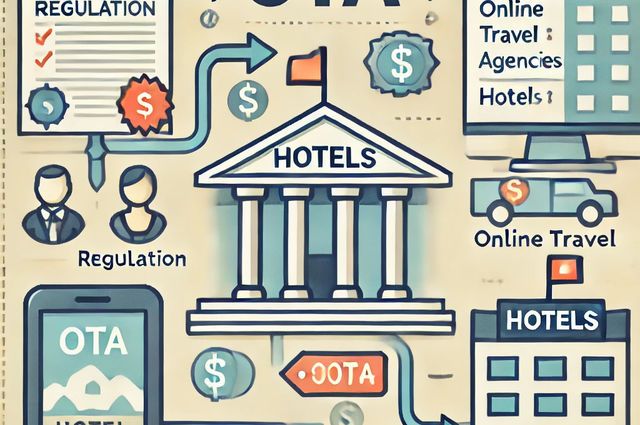Should the government be regulating commissions hotels pay to the OTAs?
8 experts shared their view
Recently, the Switzerland's price watchdog (Der Preisüberwacher / Le surveillant des prix) ruled that Booking.com's hotel commissions were "abusively high" and ordered the OTA to lower them by 25% for Swiss hotels.
Some industry executives and revenue managers applauded this ruling and called it "a bold move that was overdue." Their arguments are that hotels have been squeezed for years, commissions haven't evolved with the market, etc.
Other hospitality executives and experts called this "a terribly short-sighted government overreach that was bad for Swiss hotels." They claimed that it is never a good idea for the government to determine commissions in the private sector and that the free market should be able to decide such commercial terms and hoteliers themselves should be deciding whether to work or not to work with the OTAs and at what terms.
The question is: Should the government be regulating OTA commissions hotel pay to the OTAs?
I firmly agree that, in many cases, the fees are excessive and that OTA's have exploited the industry's vulnerabilities—particularly targeting independent hotels and softer brands.
That said, I do not believe government intervention in commission structures is the answer. Let free market dynamics determine fair pricing. OTA's are here to stay, and they've undeniably expanded our reach for years. It's the responsibility of brands, management companies, and individual hotels to negotiate favorable terms and determine the extent of their participation. Ultimately, I believe our focus should be on reducing dependency on these channels whenever strategic opportunities allow.
It certainly sounds appealing at first.
Let's protect the poor hotels from high commissionsbut if we've learned anything from economics it's that government price controls tend to create more problems than they solve.Take the example of rent controls. Sounds great on paper, but in reality, it leads to housing shortages, poor maintenance, and fewer new properties being built because you are distorting the market.
In my opinion applauding this decision from the Swiss governemnt is short sighted. Once the state steps in to control pricing in the private sector, where does it stop? Commission caps today, hotel pricing tomorrow and who knows what after.
So no the government should keep out of pricing. It's not their job, and it's not equipped for it. This sets a very dangerous precedent.
Government regulation of OTA commissions misses the real problem entirely.
The Switzerland ruling against B[dot]com feels like treating a symptom while ignoring the disease.
Short-term savings look like a quick win, but OTAs in general (and B[dot]com particularly) have the power to simply shift revenue streams at will.
Higher payment processing fees, premium placement costs, ancillary service charges... you name it.
Furthermore, this move will likely increase hotels' OTA dependency, because the "cheaper" channel suddenly looks more attractive than investing in direct booking infrastructure.
Finally, OTAs heavily invest in marketing destinations in the marketplace.
Lower profit margins mean cost cuts, which mean less marketing and reduced visibility.
It's theoretical for now, but let's see what these cheaper commissions actually deliver, especially in terms of visibility.
Bottom line: regulation creates temporary relief but weakens long-term strategic thinking.
Governments don't tend to like to get involved unless there is a good reason to do so. Constituent vote grabbing or macro consideration for economic impact or competition regulation. I've not reviewed the specifics of this situation.
Although from a position of perspective -
- A far more labour intensive, bricks and mortar business model for travel agencies used to command a 10% commission. These business did not have digital at their disposal and had high production costs.
- In a digital world where it is not labour or real estate intensive, with lower production costs and far greater reach through platforms not provided by them, it's now 25%.
...........?
I'm sure given enough time a meaningful justification could be conjured. Much more than the 200 words here. Although we do hear lots of press about the exceptional financial performance of these businesses.
Now. About those massive marketing budgets.......
While some hotels may celebrate the court's decision today as it will lower their cost, the question whether governments should regulate OTA commissions is of a much more philosophical nature.
OTAs do have a strong market position (especially Booking.com in Europe), but hotels have allowed their distribution partner to become that prominent. If hotels had invested in tech, hired knowledgeable staff or consultants, they might have expanded their own "branded" distribution and lessened the reliance on OTAs organically.
In addition - and probably even more important - what is stopping the court in Switzerland to declare that hotel rates over the Christmas/ Year-end period or any other high-demand dates are "abusively high"? Do we want to change our free market economy to a system where the government decides pricing and profits for goods and services which are discretionary in nature? Will consumers be able to bring charges when rates for their summer vacation are higher than what they want to pay?
I am interested to see how the higher courts in Switzerland will rule on this decision as it seems to run counter to our open economy.
I'm always cautious when the State steps into the dynamics of the private sector. History teaches us that once regulation begins, it rarely stops where it should.
That said, the Preisüberwacher's decision to label Booking.com's commissions as "abusively high" feels like the wrong target for the right frustration.
Yes, commissions are high. Yes, they haven't evolved in line with the market.
But I think the real issue is not the commission percentage, it's the algorithmic black box no one talks about.
Accelerators. Genius programs. Preferred listings. Over-commissioning schemes. These aren't distribution tools. They're layers of gamification that silently distort visibility and margin, nudging hotels into bidding wars they never agreed to.
Take Genius, for example: if everyone is in the program, you're not paying for extra visibility; you're paying not to be penalized. It's no longer a benefit; it's protection dressed up as a marketing boost.
The abuse isn't always in the commission % on the invoice. It's in the opaque logic that determines whether your hotel gets seen or not.
So no, I don't think governments should be setting commissions. But I do think we need to shine a light on how the distribution game is being played.
Governments should not regulate prices in a competitive market. The travel booking landscape is not a monopoly, and price controls rarely benefit consumers. There is no guarantee that hotels will pass on savings from lower commissions; they are most likely to keep the difference. This intervention also misunderstands the value exchange. Hotels pay a variable fee for global reach, technology, and risk-free marketing. A government agency isn't suited to decide the fair market price for this service. The free market, not government rules, should determine commercial terms through negotiation between parties that understand and assume the risks.
For years, many hotels have underinvested in their own digital marketing and booking platforms, opting instead for the cost-free investment structure provided by online travel agencies (OTAs). It is paradoxical to complain about a fee for a service so eagerly used to attract customers. Furthermore, price-setting establishes dangerous precedents. Capping commissions disincentivizes OTAs from investing in the technology and extensive marketing reach that hotels depend on. If OTA revenue is artificially restricted, they may cut marketing spending in that area, resulting in decreased visibility and fewer international bookings for the very hotels the regulation was intended to support.
Since when it's a good thing for the government to determine commissions in the private sector? Commissions are charged in many industries: from insurance to sales to real estate. Why doesn't the government regulate them all? And why decrease the commissions by 25% and not by 19.5% or 26.8%? This tells you that this was a random number pulled out of judges' hats without any accounting or business analysis.
And, how lowering OTA commissions by government edicts will help making the market fairer? This will not decrease the duopoly of Booking and Expedia, on the contrary: lower OTA commissions will lessen the incentive for hotels to invest in their direct distribution.
In my view, hoteliers should not be celebrating. Hoteliers rejoiced when in 2014 France outlawed the requirement for rate parity in OTA contracts. Five years later, the OTA market share in France has doubled at the expense of the direct channel.
To compensate for this new regulation, most probably Booking.com will introduce new visibility and other fees Swiss hoteliers will have to pay to participate.
It's a free market - hoteliers have to able to decide whether to work or not with the OTAs and at what terms.








